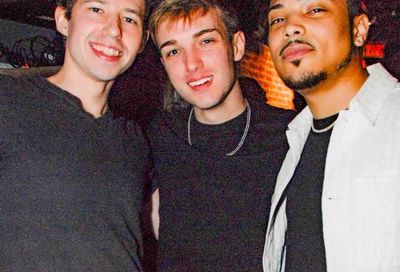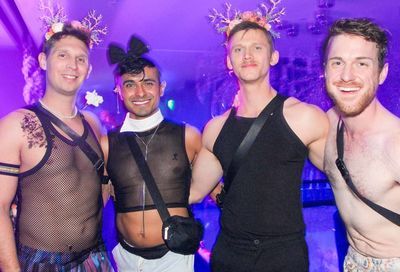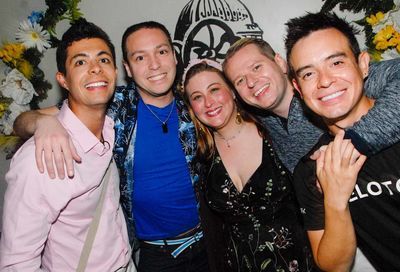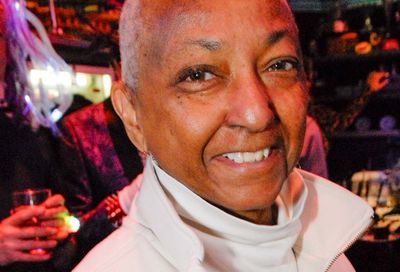Survey: Two-thirds of LGBTQ people experience anxiety disorders
LGBTQ community nearly three times more likely to experience mental health conditions

LGBTQ people are more likely to be at risk for mood or mental health disorders, and may resort to using illicit drugs to cope with their problems.
That’s according to a recent survey by Take 5 Media Group on behalf of the Florida House Experience, a drug and alcohol rehabilitation facility. They asked 1,033 respondents who identified as LGBTQ to self-report any mental health disorders, and the incidence of illicit drug use by themselves and others.
“We wanted to take a dive and look at different communities, and specifically drug use within communities, and how that plays a role with any mental health issues,” says Logan Freedman, a data scientist who served as the lead researcher on the survey.
According to the findings, 64.35% of respondents said they suffered from or had been diagnosed with some form of anxiety disorder, including generalized anxiety disorder, panic disorder, social anxiety disorder, or various phobias.
About half of all survey respondents (49.63%) said they suffered from mood disorders, which run the gamut from depression to bipolar disorder.
About 18% of respondents reported suffering from an eating disorder, a statistic that surprised Freedman because it is higher than the incidence of such disorders among the general populace. About 18% reported suffering from impulse control and addiction disorders, and another 18% report suffering from post-traumatic stress disorders.
According to the National Alliance on Mental Illness, members of the LGBTQ community are nearly three times more likely to experience mental health conditions than the average person. That higher rate of mental health problems is often attributed to challenges that LGBTQ people may face, such as discrimination, prejudice, or societal rejection. As a method of coping, some may resort to self-medicating.
A little less than one-third, or 32.50%, reported they have had problems with drug addiction. When asked for the reasons behind their decisions to use, 38.46% cited feelings of loneliness and a lack of intimacy or someone in whom to confide. The next highest-cited reason was rejection or shame from family and friends, which was cited by 24.59% of respondents.
Other top reasons for drug use included frustration stemming from an inability to pursue a love interest, loss of employment or stagnation at work, isolation arising from public ridicule or rejection, internalized homophobia or self-hate, and discrimination based on one’s sexual orientation.
Freedman says he expects to conduct future surveys that will take a more in-depth look at reasons why people pursue drug use.
When it comes to the type of drugs utilized, 69.77% said they use marijuana to cope with mental health or mood disorders, while 17.44% say they use Xanax or benzodiazepine, 12.24% use cocaine, and 11.38% use ecstasy.
“The number of LGBTQ people using Xanax is very shocking, because when you look at the general population, the drug most used after marijuana is usually opiates,” Freedman says. “But for the LGBTQ community, it’s anti-anxiety drugs. If you look at the reasons why people say they use, it makes sense why they’re self-medicating with anxiety drugs instead of pain relief drugs.”
Freedman says that the findings in the survey are important to analyzing how drug use affects members of the LGBTQ community. The survey can also provide lessons on how people struggling with mental or mood disorders to seek help, and serve to warn people who are close to LGBTQ individuals to be on high alert for any problems that may develop from mood disorders or self-medication, he says.
Support Metro Weekly’s Journalism
These are challenging times for news organizations. And yet it’s crucial we stay active and provide vital resources and information to both our local readers and the world. So won’t you please take a moment and consider supporting Metro Weekly with a membership? For as little as $5 a month, you can help ensure Metro Weekly magazine and MetroWeekly.com remain free, viable resources as we provide the best, most diverse, culturally-resonant LGBTQ coverage in both the D.C. region and around the world. Memberships come with exclusive perks and discounts, your own personal digital delivery of each week’s magazine (and an archive), access to our Member's Lounge when it launches this fall, and exclusive members-only items like Metro Weekly Membership Mugs and Tote Bags! Check out all our membership levels here and please join us today!





















